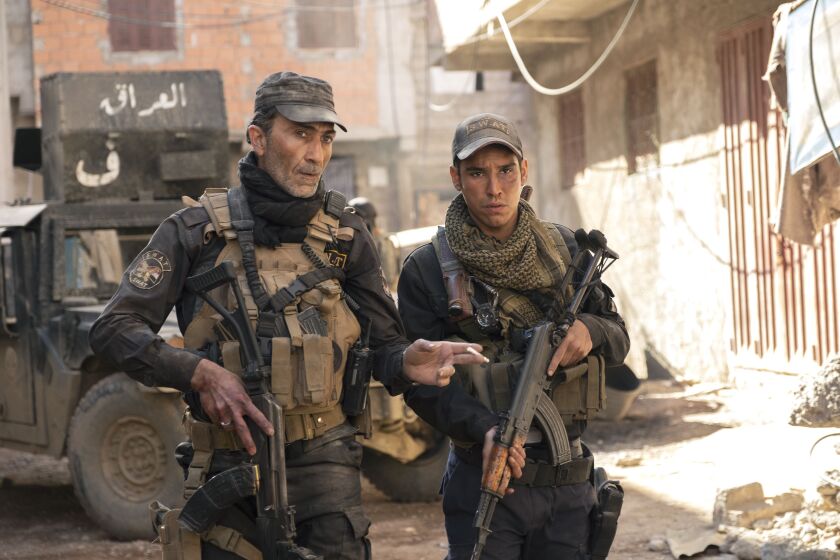What is your mission? That’s what the brand new recruit wants to know. We’re seeing heavy action in this bombed-out city, we’re moving from strategic spot to strategic spot, we’re taking heavy fire, we’re hot and tired and some of us are injured but we have to keep going … where?
What is your mission?
“It’s OUR mission now,” comes the reply from the veteran soldier. “And if you f--- it up, I’ll kill you.”
Only in the final act of “Mosul” do we learn the true nature of the mission being carried out by an elite, rogue squad of Iraqi soldiers known as the Ninevah SWAT team, who operate outside the command of the regular Iraqi Ground Forces,barreling through the bombed-out streets of the major northern city of Mosul in 2017, intent on defeating ISIS by any means necessary. Let’s put it this way: If they capture an enemy combatant, there will be no imprisonment or war crimes trial. Execution will be immediately forthcoming.
Based on a memorable New Yorker article by Luke Mogelsen, filled with visceral punches to the senses, shot in a verité style by director Matthew Michael Carnahan (writer of “The Kingdom” and “World War Z”) and produced by a team including the Russo brothers of Marvel Universe mega-success, “Mosul” is a lower-budget but worthy companion to some of the best intense-combat war movies of this century, from “Black Hawk Down” to “The Hurt Locker” to “American Sniper” and this year’s “The Outpost.” Filled with P.O.V. docudrama camera angles that place us squarely in the middle of the action, “Mosul” follows a small band of anti-hero renegades in close to real time, as they target the remaining ISIS strongholds in their home city and try to stay alive while also trying to protect the locals. This is a sometimes wrenching and draining film, but it’s also a powerful and ultimately deeply moving tribute to a group of good and decent men who have been emotionally and, in some cases, physically wounded by war but refuse to surrender.
We follow the action through the experiences of the newest recruit, a young Kurdish police officer named Kawa (Bilal Adam Bessa), who has been on the job for all of two months when he and his partner are pinned down by ISIS gunfire and rescued by Ninevah SWAT team leader Major Jasem (Suhail Dabbach) and his men. The SWAT team takes only those who have been injured by ISIS or have a lost a family member to them. When Jasem learns Kawa’s uncle has been murdered by the terrorists, he informs Kawa his police career is over and he’s now a member of the team. Recognizing this is his best chance for survival, Kawa joins the mission, learning the ropes along the way from Jasem and the battle-tested second in command, Waleed (Is’haq Elias).
Every time Jasem and his men occupy an abandoned home or a rooftop or some other temporary outpost, Jasem quietly goes about picking up any trash and placing it in a waste basket, as if he’s trying to find some sense of order amidst the chaos. Suhail Dabbach, who was born in Iraq and has lived in the United States since 2008, deserves Academy Award consideration for his quietly commanding performance as Jasem, a classic war hero character who balances uncompromising dedication to the mission with a genuine concern for his men and the citizens of Mosul. (A scene in which Jasem tries to persuade two young brothers to come with him and leave behind the remains of their father is one of the most intense moments of the movie year.)
With great contributions from director of photography Mauro Fiore and editor Alex Rodriguez, and with Morocco standing in for Mosul, writer-director Carnahan has delivered a gripping, intense recent-history war film. This is one of the best movies of 2020.


